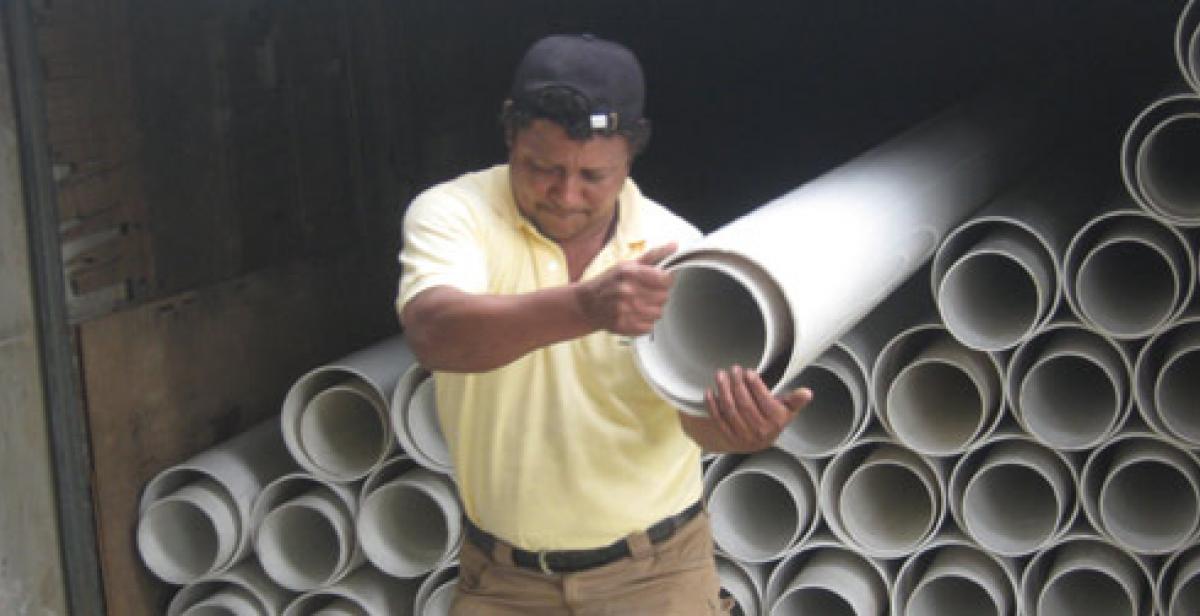Marvin is a Nicaraguan development worker, currently working as an agroecology specialist with COOMUPL (Mixed Cooperative “United for Progress” Limited) in Honduras.
What is your work background?
My background is agroecology and environmental management.
Before joining Progressio I worked for UNAG ( the Nicaraguan National Union of Farmers and Ranchers) offering training to groups of farmers interested in switching their farming systems to a healthier and more environmentally-friendly type of agriculture through the Campesino a Campesino (Farmer to Farmer) programme.
How would you describe yourself?
I am a dreamer and I set myself goals until I achieve them. I believe in helping others and am committed to nature and my family, and to the poor, destitute and marginalised. I feel happy when through passing on my knowledge I can see changes in other people, changes that make a difference to their way of life.
What inspired you to become a development worker with Progressio?
The opportunity to share knowledge with development worker colleagues of different nationalities, as well as being able to use my training to help marginalised families and change attitudes in favour of a better life.
The first thing I thought about when visiting the first
What is your first memory of arriving in Honduras?
communities was my family because I come from a farming background. I am always reminded that the farmer is very special to mankind because from his hands and sweat food is produced for a human race that consumes food on a daily basis without knowing how it is produced or how it reaches our homes.
What do you enjoy most about your role?
I enjoy nature, sharing ancestral knowledge with the farmers, which has made me take a closer look at nature, do more research into organic farming and combine the scientific-technical know-how with knowledge from our past. This is especially important because in the countryside there is a wealth of information about changes in nature, knowledge that has been passed down from generation to generation, but it has been superseded by modern technology.
What has been the most exciting moment so far?
When the farmer Faustino Reyes from the San Marcos community in the Atlántida region, after two years of sharing knowledge with him, described the changes in himself, the farm and his family: he has stopped logging and now dedicates himself to improving his farm through environmentally-friendly practices and to teaching his neighbours through his own example. He wants to educate the young about protecting the environment and has converted his farm into a school for agricultural education and experimentation.
What has been the biggest lesson so far?
Maintaining communication between partners and development workers.
What is the biggest development challenge facing Honduras and the area in which you are working?
Focusing on environmental policies so that they are adhered to, as well as regulations, in order to prevent the continued exploitation and destruction of natural resources.
Developing the partners’ skills to enable them to contribute to a better quality of life for the most marginalised families.through the good management of water, soil, and forest resources, leading to the generation of income and permanent employment without putting nature and future generations at risk.
If you could change one thing, what would that be?
The Constitution, I would add a chapter on respect for Mother Earth and introduce the application of environmental laws.
What strikes you the most from the development worker Model?
We are development workers committed to helping the poorest and least protected, and we fight for a more environmentally healthy world and for a more just society.
What is your favourite motto or saying?
If I hear it I forget it, if I see it I remember it, but if I do it I learn it.
What advice would you give to someone who is thinking of becoming a development worker?
Grab the opportunity to become a development worker with Progressio – it is your chance to be of service to others. Being a development worker is even more of a privilege when you believe in the principle of helping for change, and it is ultimately gratifying when the partners recognise the contributions of your work.
Where do you see yourself once your placement has ended? And in what ways is this placement with Progressio assisting you to get there?
When I finish my placement I will return to my country to farm the land, serve my community and my family, and continue fighting for a fairer world and a healthier environment.
Is there anything else you would like to add?
Working for Progressio is an education because it is a multidisciplinary organisation which brings together development workers of different nationalities.



